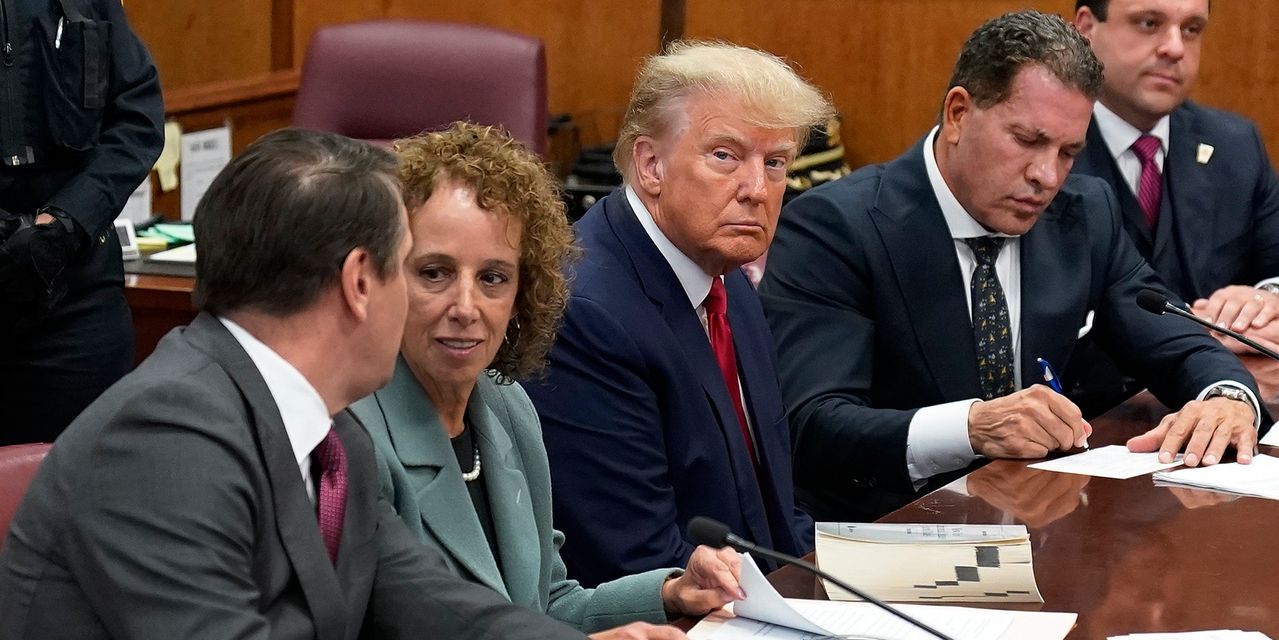Former president Donald Trump was charged Tuesday with 34 felony counts of falsifying business records for his alleged role in hush-money payments that were made during his 2016 presidential campaign to cover up damaging stories that threatened to emerge.
Trump pleaded not guilty during an extraordinary hearing in Manhattan’s Supreme Court, where he appeared amid a wild melee of media and protesters outside.
“At its core, this case is about someone who lied again and again to protect their interests.” Manhattan District Alvin Bragg said at a press briefing after the hearing.
In all, the charges carry a maximum sentence of up to 136 years in prison but it is unlikely he would face that if he is convicted.
Trump’s attorneys said the case appeared baldly political and that he intended to fight the charges all the way.
“If this man’s name was not Donald Trump, there is no scenario where we would be here today, based on these charges,” Trump’s attorney Joe Tacopina said on the courthouse steps after the hearing concluded.
The hush-money charges mark an extraordinary turn of events for Trump, who has been under investigation for election interference in Georgia and the storage of classified documents at his Florida mansion, as he seeks to make a political comeback with a run for the White House in 2024.
The Manhattan case hinges around three payments made to a porn star and a former Playboy bunny who had alleged they had had affairs with Trump and to a doorman at one of Trump’s buildings who tried to sell a story alleging the presidential candidate had an out-of-wedlock baby with an employee.
The payoffs, which involved the efforts of the National Enquirer and Trump’s then-personal lawyer, Michael Cohen, amounted to a “scheme to identify, purchase, and bury negative information about him and boost his electoral prospects,” prosecutors said.
Prosecutors said the charges in the case revolve around the efforts to obscure the payments by having them made by the National Enquirer and Cohen and then recording a series of reimbursement payments to Cohen as legal fees.
Bragg said the falsifying business records charges became felonies because they were done in furtherance of another crime, namely violations of New York State election law.
“New York state election law makes it crime to conspire to promote a candidacy by unlawful means,” Bragg said.
According to court documents, the scheme dated back to a 2015 meeting at Trump Tower not long after Trump had declared his candidacy for president, in which he and Cohen asked David Pecker, the CEO of the Enquirer’s parent company, American Media Inc., for help in identifying and making damaging stories about Trump go away.
Over the course of the next year, three such payments were made, prosecutors said.
“So what do we got to pay for this?
The central payoff involved porn star Stormy Daniels, whose real name is Stephanie Clifford, who was paid $130,000 in 2016 by Trump’s then-personal lawyer, Michael Cohen. The payment was made after Clifford had approached the National Enquirer, offering to sell her kiss-and-tell story about having sex with Trump at a celebrity golf tournament in 2006.
Clifford then signed a non-disclosure agreement and the National Enquirer never published the story — a tabloid journalism practice known as “catch and kill.”
Cohen initially made the payment using money he took from a home equity loan on his house, and funneled it to Clifford through a shell company he created in Delaware. Cohen, who pleaded guilty in 2018 in federal court to campaign finance violations for his role in the payoff, said he was directed to make the payment by Trump who later reimbursed him through his company.
That payment was recorded by Trump’s company as being for legal services. Federal prosecutors had argued that the payments amounted to illegal, unreported assistance to Trump’s campaign.
Trump was never charged in the federal probe but was listed in court documents as “co-conspirator number one.”
The former president has denied having an affair with Clifford and has characterized her selling the story as extortion.
Cohen had also been involved in orchestrating an earlier “catch and kill” payment in 2016 to former Playboy bunny Karen McDougal, who was given $150,000 for her story of having an affair with Trump by the National Enquirer which then never ran an article.
In a meeting with Cohen to discuss that payment, Trump allegedly asked: ‘So what do we got to pay for this? One fifty?,,’” according to court records. Trump suggested the payment be made in cash, but Cohen counseled against that and said he would create a shell company to make to payment instead.
A third episode involved a former Trump building doorman named Dino Sajudin, who was paid $30,000 by the Enquirer for the rights to a story in which he claimed Trump had had a child out of wedlock with an employee.
Trump has always denied the allegations. In Sajudin’s case, editors at the Enquirer admitted they didn’t believe his story, but paid him anyway.
The editor and publisher of the National Enquirer were given non-prosecution agreements in exchange for their cooperation with the federal investigation.
After Trump won the election, the chief financial officer for the Trump Organization created the payment structure to reimburse Cohen, breaking it up into a series of 11 checks over the course of nearly a year, to make it appear as an ongoing legal retainer fee. The agreement was to pay Cohen double what he laid out plus $50,000, so he would be made whole after paying taxes on what was designed to appear as income.
The arrangement was confirmed by Trump during a meeting with Cohen at the Oval Office shortly after he took office in 2017.
Read the full article here








